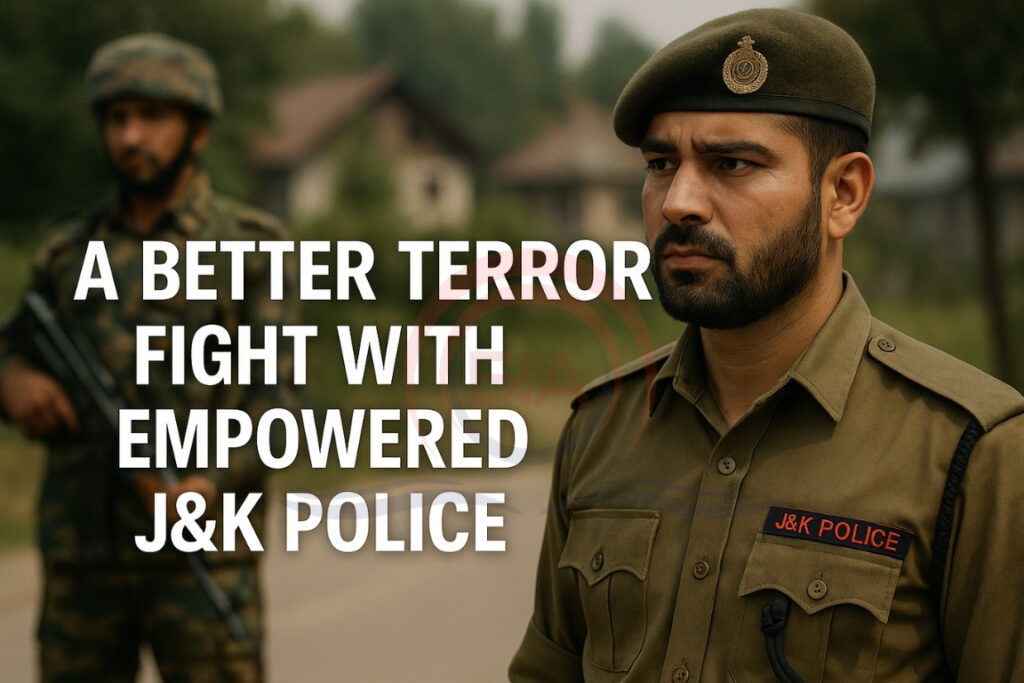On June 16, 2025, the Lieutenant Governor of J&K emphasized the importance of using technology and local police in tackling terrorism. This has revived discussions about placing the J&K Police (JAKP) under the control of an elected government to improve efficiency and community trust.
Role of Local Police in Counter-Terrorism
- Local police play a central role in fighting terrorism, unlike central forces that can only provide support.
- JAKP officers are familiar with the terrain, people, and local dynamics, which enhances intelligence gathering.
- Their connection with residents helps in receiving timely inputs on terrorist activities and overground workers.
Need to Address Intelligence Gaps
- The April 22, 2025 Pahalgam attack highlighted a serious lapse in human intelligence (HUMINT).
- Without local-level inputs, such attacks can go undetected.
- Enhancing community-based policing is key to preventing future terror incidents.

Restoring Democratic Control over Police
- It is important to place the JAKP under the control of elected governments to improve transparency and accountability.
- Locals feel more confident sharing sensitive information with elected representatives like sarpanches or MLAs rather than with central officers.
- Elected leaders are vital in bridging the gap between citizens and law enforcement.
Reviving Participatory Governance in J&K
- J&K has seen high turnout in local body elections, indicating strong democratic spirit.
- However, elected representatives have been kept away from real decision-making, especially in security matters.
- All levels of governance—from panchayats to Parliament—must be included in the security structure.
Encouraging Police-Community Partnership
- Structured interaction between police and local leaders can improve trust, gather intelligence, and address community fears.
- Counter-terrorism must account for the regional differences within J&K, which need local solutions, not uniform strategies.
- Police stations (thanas), being grassroots units, are ideal for working with local bodies.
Way Forward
- Holding elections is a good first step, but empowering elected officials and restoring JAKP control to them is necessary.
- Inclusive governance ensures that people’s choices are respected, leading to better policing and security.
Who is the Lieutenant Governor & What is His Role?
The Lieutenant Governor (LG) is the constitutional head of certain Union Territories (UTs) in India. He is appointed by the President of India under Article 239 of the Constitution. The LG is similar to a Governor but functions in UTs instead of States.
Constitutional Role of LG in UTs
- Administers Union Territories:
- The LG represents the President and governs the UT on behalf of the Central Government.
- Executive Authority:
- In UTs without a legislature (e.g., Andaman & Nicobar Islands, Ladakh), the LG has full executive powers.
- With Legislative Assembly:
- In UTs with legislature (like Delhi and Puducherry), LG shares powers with the elected government.
- However, in Delhi, the LG can act independently in matters of police, public order, and land (Article 239AA).
- Acts on Aid and Advice:
- Where an elected government exists, the LG usually acts on the advice of the Council of Ministers, except in matters where he is allowed to act at his discretion.
- Can Refer Matters to President:
- If there’s a conflict with the Council of Ministers, the LG can refer the issue to the President, and can withhold action till a decision is made.
Conclusion:
A collaborative model between police and elected representatives will help create a stronger and community-driven fight against terrorism in Jammu and Kashmir.





